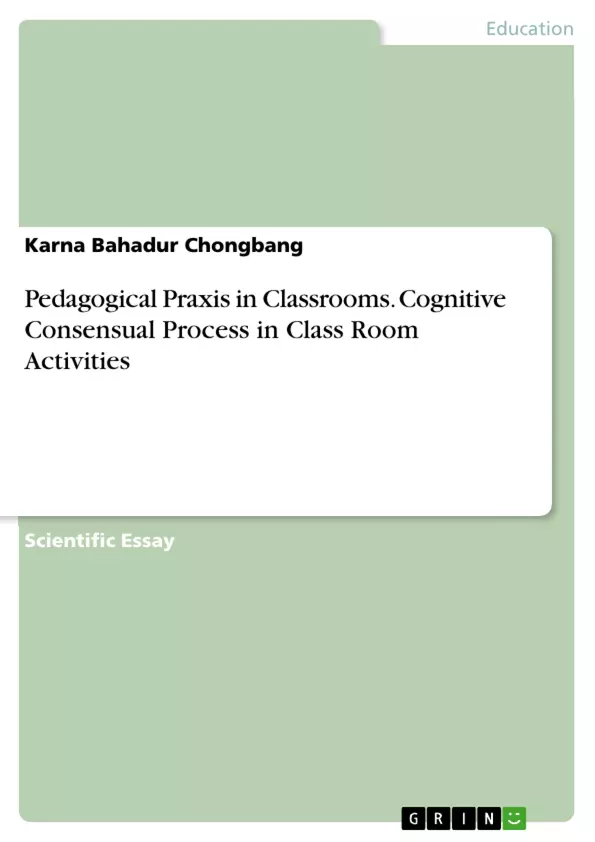The teacher educators of higher education have been practicing the pedagogy in the classes with the pedagogical consciousness. In this context, this paper attempts to meet the following objectives: to explore the state of naïve cognitive consensus in classroom; to elicit the teacher educators' perspective on the naïve cognitive consensus of the classroom: to analyze the naïve cognitive consensus.
In the ancient era, religious leader, philosopher, Guru, Rishi et cetera used to give wisdom or knowledge to their followers, shisyas or disciples gathering them in certain public places. When formal school systems came into existence, classroom concepts emerged as the closed learning group in the formal schools. The public school systems which were state supported, secular free schools for all children are the historical features of the formal education. Classes of schools and universities are intentionally and formally formed with purpose of learning.
The purposes of school and university education were to fulfill the goals of the nation which had neglected the needs and aspirations of individuals. The pedagogical paradigms institutionalized and practiced across the years can be broadly categorized into four orientations; such as philosophical orientation, psychological orientation, socio-cultural orientation and techno-cultural orientation. In other words, it can be classified into teacher centered, student centered, group interaction, group learning or non-centered teaching and e-teaching or e-instruction.
In the context of Nepal, formal classroom pedagogical practice initiated in 1853 A.D. in Thapathali Darbar, later Darbar School. In 1956 A. D., College of Education was established to produce and train school teachers. This effort enforced to develop and practice pedagogical theories in the classroom. At present, the teacher education programs run under various universities are responsible to produce teachers for the schools of Nepal. In this context, classroom pedagogical discourse is the heart of present teacher education and the educators.
Inhaltsverzeichnis (Table of Contents)
- Introduction
- Objectives
- Methodology
- Meaning of naïve consensus
- Societal bases of cognitive consensus in class
- Curriculum expected cognitive structure
- Consensus beyond the conscious teaching
- Consensus orientation in the innovative pedagogical approaches
Zielsetzung und Themenschwerpunkte (Objectives and Key Themes)
This paper aims to explore the prevalence of naïve cognitive consensus in classrooms where teacher educators consciously apply pedagogical knowledge to transform students' content-specific cognitive structures. It examines the implicit cognitive consensus among students, often overlooked by pedagogical theory and practice, influenced by societal factors, curriculum design, and the concept of classroom learning communities.
- Naïve Cognitive Consensus in Classrooms
- Teacher Educators' Perspectives on Naïve Cognitive Consensus
- Influence of Societal Factors on Cognitive Consensus
- Role of Curriculum in Shaping Cognitive Structures
- Impact of Innovative Pedagogical Approaches on Consensus
Zusammenfassung der Kapitel (Chapter Summaries)
- Introduction: This chapter introduces the historical evolution of classroom learning, tracing the development of formal education from ancient times to modern pedagogical paradigms. It highlights the significance of classroom pedagogy, particularly in teacher education programs, and provides context for the study.
- Objectives: This chapter outlines the specific goals of the research, which include exploring the presence of naïve cognitive consensus in classrooms, eliciting teacher educators' perspectives on this phenomenon, and analyzing its underlying causes.
- Methodology: This chapter details the qualitative research design employed, including the use of auto-ethnographic methods, methodological triangulation, and theoretical triangulation to collect and analyze data. The selection of participants and data collection methods, such as classroom observation, student responses, and teacher interviews, are described.
- Meaning of naïve consensus: This chapter defines the key term "naïve consensus," examining its theoretical underpinnings and exploring its implications for classroom learning. It draws on existing literature to illustrate the concept and its connection to the development of collective knowledge and group belongingness.
- Societal bases of cognitive consensus in class: This chapter explores the influence of societal factors on the formation of cognitive consensus within classrooms. It highlights the role of widely accepted information, knowledge, and values prevalent in society and the impact of inter-subjectivity theory on understanding shared understanding.
- Curriculum expected cognitive structure: This chapter examines the influence of curriculum design on the development of cognitive structures among students. It analyzes the impact of hierarchical curriculum structures, specialized contents, and the role of pre-service teacher education programs in shaping student understanding.
- Consensus beyond the conscious teaching: This chapter explores the role of pedagogical strategies in fostering cognitive consensus beyond the explicit aims of curriculum. It examines the impact of using diverse teaching methods, such as lecture, discussion, and peer feedback, on student engagement and conceptual development.
Schlüsselwörter (Keywords)
This paper focuses on the concept of cognitive consensus, examining its presence and impact in classroom learning environments. Key terms include cognitive consensus, cognitive structure, classroom pedagogy, collaborative learning, and teacher education. It explores the influence of societal factors, curriculum design, and innovative pedagogical approaches on the formation and development of cognitive consensus among students.
Frequently Asked Questions
What is "naïve cognitive consensus" in a classroom?
It refers to the implicit, often unconscious shared understanding and values among students that exist alongside the formal curriculum, influenced by society and group dynamics.
How does the curriculum shape cognitive structures?
Hierarchical curriculum designs and specialized contents are intended to transform students' initial knowledge into structured, academic cognitive frameworks as defined by educational goals.
What is the role of teacher educators in this process?
Teacher educators use pedagogical consciousness to bridge the gap between students' existing beliefs and the expected academic outcomes, often navigating the "naïve consensus" present in the room.
How did formal education evolve in Nepal?
Formal classroom pedagogy in Nepal began in 1853 at Darbar School, with a significant expansion in 1956 through the establishment of the College of Education to train teachers.
Can innovative teaching methods foster consensus?
Yes, methods like group discussions and peer feedback can strengthen the shared cognitive structure of the group, leading to a more collaborative learning environment.
- Arbeit zitieren
- Lecturer Karna Bahadur Chongbang (Autor:in), 2017, Pedagogical Praxis in Classrooms. Cognitive Consensual Process in Class Room Activities, München, GRIN Verlag, https://www.grin.com/document/376779



